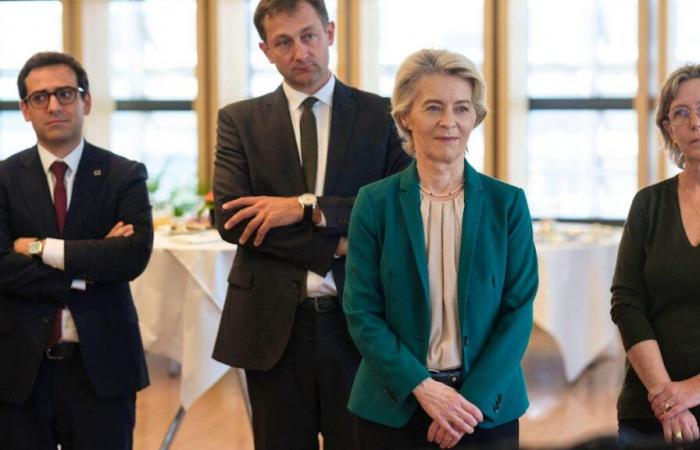MEPs voted on Wednesday in Strasbourg in favor of the new European Commission, which will take office at the beginning of December. The European Parliament supported Ursula von der Leyen’s new team by 370 votes for, 282 against and 36 abstentions.
Ursula von der Leyen’s second term will be able to begin, around fifty days before the inauguration of Donald Trump as president of the United States. A sense of urgency prevailed. Europe has “no time to lose” warned the President of the Commission, prioritizing competitiveness to “bridge” the gap with the United States and China. “Our freedom and our sovereignty depend more than ever on our economic power,” she insisted.
In terms of defense, Ursula von der Leyen then insisted on the need to do more to compete with Russian military spending, at a time when the return of Donald Trump raises fears of a disengagement of the United States in Ukraine. “Our expenses must increase,” said the 66-year-old German. “Russia spends up to 9% of its GDP on defense. Europe spends on average 1.9%. There is something wrong with this equation.
Preparing for the return of Donald Trump is “the most urgent challenge” for the EU, underlines Luigi Scazzieri, analyst at the Center for European Reform. On “two fronts”: trade, with the Republican president-elect’s promise to increase customs duties on European products, and “security”, with the war in Ukraine. Despite these challenges, the European Parliament will have struggled before approving the new Commission.
The groups clashed over the vice-presidency granted to the Italian Raffaele Fitto (Territorial Cohesion), member of Giorgia Meloni’s far-right Fratelli d’Italia party, while the left demanded the maintenance of a “cordon health”. Von der Leyen assumed this vice-presidency, which allows him to maintain his relations with Ms. Meloni. “It’s a choice that I made,” she stressed to MEPs.
After several days of standoff, the EPP (right), the centrists of Renew and the social democrats ended up sealing an agreement to approve all of the proposed commissioners, a first in twenty years. Among the new faces: former Estonian Prime Minister Kaja Kallas becomes the new head of EU diplomacy, French centrist Stéphane Séjourné gets a vice-presidency with a broad portfolio on industrial strategy, and Spanish socialist Teresa Ribera will be vice-president for ecological transition and competition.
This new Commission leans to the right with around fifteen portfolios, out of 27, allocated to the EPP (right), the main political force in Parliament. EPP leader Manfred Weber did not hide his satisfaction. It is a “very balanced” Commission, he said, mentioning a possible parliamentary majority ranging from ECR (extreme right), where the Italian MEPs of Giorgia Meloni sit, to certain Greens.






